I’ve just returned from Berlin, where I gave a presentation on the state of the multi-modal sector at the annual ITB Conference. Being in Europe was a good opportunity to meet some of the companies I talked about in person, and get a better handle on how and why they’re taking the course they’re on.
My presentation is online and viewable here, but it’s boring without the text. So here’s an overview of what I said about the various players, with the addition of what I learned afterwards as I met with some of them and heard their opinions on where the market is headed.
I met the Mytripset team in Paris at the SNCF Headquarters. Frankly, I had been surprised that SNCF, a big and conservative rail company, had developed such a cool product, and done it so quickly. During my visit I learned from Alexia Boulot, Project Leader for Mytripset, that the initial development was done by a very small team in only four months. That’s quite an achievement, although on the minus side the site remains French-language only, and is still in beta. I suspect there are competing views within SNCF about the Mytripset product: some who see multi-modal as being an obvious progression, while others wonder why SNCF would even consider selling air, bus, carpool and ferry! In any case I was impressed by the team and expect this product will gain in popularity as they bring the complete vision together. Whether that popularity extends beyond France is another matter, but maybe SNCF aren’t too worried on that point.
I met with founders Maxim Nohroudi and Tom Kirschbaum at Waymate’s very central, very fine offices in Berlin, and found myself in the middle of a company that had recently split itself in two, though in a good way.
Maxim demonstrated their (relatively) new Allryder app on the iPhone: it’s a journey planner focused on mass transit and other options (taxi, carshare) in cities all across Germany, and it’s very impressive. Allryder is one half of the picture; the other half is the “traditional” Waymate business, the one I was familiar with and which I worried might be getting less focus in the re-shuffle. Not so, Maxim told me, however the emphasis will be switching to more focus on air-related functionality and user feedback / reviews. I have to admit I’m not quite sure about that shift; I’m a fan of Waymate’s excellent UI (Maxim confirmed they were heavily influenced by Hipmunk) and hope they stay fully engaged as a multi-modal player.
Thank goodness they have an English name, as the original German name of this Munich-based company—VerkehrsmittelVergleich—is beyond my limited ability to pronounce German words. I met co-founders Johannes Grassman and Veit Blumschein for lunch at ITB (it’s hard to get a decent lunch at ITB, by the way; lots of sausages and pizza and not much else). Like me, they are firm believers that all the boats in the multi-modal space can rise on the same tide, and we had a good discussion about their progress and where they see the market heading. Having been around since 2008 these guys know more about the market than most, and they’ve garnered great SEO juice along the way.
That means strong traffic to their B2C site and has them well placed as the current leader among the European sites, I think. (By that I mean the multi-modal site that’s generating the most traffic to its booking partners.) One interesting topic of conversation was the constant issues they have with suppliers who change their APIs without notice, creating unexpected results and errors on connected sites like FromAtoB. Given Rome2Rio’s strategy of no API connections until the user (optionally) enters dates, I admit to a little schadenfreude (a German word I can pronounce) when I heard this! In any event, I predict continued growth and success for this very focused and experienced team.
Naren Shaam, GoEuro’s founder, was all across the media earlier this year with news of further investment in his Berlin-based startup, and kept the party mood going by hosting an event on Tuesday night prior to ITB, in concert with the Travel Massive meet-up that attracted hundreds of industry revelers. I suppose throwing a party is a good way to spend a VC’s money, but Naren says his real focus is building API connections to rail and bus operators in Germany, Spain and the UK. GoEuro currently list 37 completed connections on their site and Naren tells me they have plenty more in the works. Based on feedback I got from competitors and various rail operators during my trip, no-one is taking GoEuro lightly. With 49 staff (and counting) this is a typical VC-backed play with the “go big or go home” strategy that can lead to big wins… or savage implosions if things go wrong. One thing I can’t get my head around is where the traffic will come from: GoEuro claim a current average of 1.8m unique visitors per month, which seems remarkably high for a site that currently focuses on only three markets. To get ahead of that spending curve they’ll need plenty of traffic and great conversion, and I wonder if the balance (high overheads : narrow geography) can work. Time will tell, but for the moment they seem to be on track and confident in their progress.
I described this Swiss company as the grandfather of the sector; they’ve been around since 2006 but differ from the other European players in that they are B2B only; the consumer facing site is essentially an advertisement for their B2B services. They’ve had success signing partnerships and count BCD and Hogg Robinson as clients, along with Zurich Insurance, the Swiss Government and the World Economic Forum. CEO Jochen Mundinger is a little like a Swiss banker: he doesn’t let on any more than he has to, so my understanding of Routerank and how they’re faring is somewhat limited. I’m going to guess that delivering customised multi-modal solutions for licensees is essentially a services business and Routerank’s outlook is a lot different to that of the other companies listed here.
We know a little about this Rome-based startup because they use our API. We’re not exactly sure what they do with it as they add their own data to ours before displaying results. Still, we love their UI and think their step by step approach to itinerary building is a real winner, or at least a good first step. Their focus is naturally enough on Italy and the next-door states, but tests I’ve done for journeys across Europe have all worked well. We expect to see more of Wanderio; they will benefit from the fact they’re not in Germany and don’t appear to have any major competitors in their home market. This tiny player could end up a big winner by simply being very good at multi-modal in Italy and the immediately surrounding countries.
Deutsche Bahn – Qixxit
This was a surprise. I knew DB had released a product back in September last year, but I guess the day I looked at it the site was down and then I forgot all about it. Fast forward to Europe two weeks ago and everyone is asking the same question: what do you think of Qixxit? Well, I’m pretty impressed. Both the web and app versions have beautiful UIs; it’s fast; the data, coming mostly from DB is of course super-reliable; and the coverage across Europe is comprehensive. But there are minuses too: it’s still in beta, and it’s in German language only. And there’s no flights, either, which in my opinion means it doesn’t really qualify as a complete multi-modal site yet.
And finally the name is sorta weird: I don’t think it means anything in German, and it’s hard to know how to say or spell it in English. DB had a 3rd party developer create Qixxit for them and it’s easy to see that the people who designed bahn.de were not involved (that’s not a criticism, just an observation; Bahn.de is an amazing site!). But I wonder what will happen to the product once it comes back in-house, under the wings of the myriad committees that hold sway in a huge corporation like DB? On the one hand I worry that if Qixxit is managed like a startup it could easily crush competitors in the European multi-modal space, while on the other hand I think it will be interesting to watch DB attempt to compete against nimble, focused competitors like GoEuro and FromAtoB, who really are startups!
Multi-Modal: Different Architectures
There’s a stark difference between the technology approach the European sites have taken, and the approach we’ve taken here at Rome2Rio. The European sites use an API-based approach, where—just like in traditional flight search—they connect in real-time to third party APIs (eg a rail operator, a bus operator, a rideshare operator) in order to collect the data they show in their search results. The clear upside of this approach is that their results have a lot of information that’s really helpful for bookings: availability, exact schedules, exact fares. The downsides, however, are real, and the market has yet to determine which approach it prefers best.
Rome2Rio sees multi-modal as a search engine problem. We hold indexed data in a vast memory store and produce results almost instantly, just like Google or Bing. We consider the sacrifice we make in terms of booking-related data—we show frequency, not schedules, and estimated fares instead of exact fares—is reasonable given the benefits of an instant result.
This trade-off—speed of results vs. booking-related data—also impacts coverage. API connections take time to build, and many suppliers (think buses and ferries in particular) simply don’t offer them. That means Rome2Rio has quickly built broader (and deeper) geographic coverage, while the European sites are largely focused on major operators in Europe.
As stated, the market has yet to determine which of these approaches it likes best. Chances are there’s enough room in the space to accommodate winners from both sides of the coin.
Booking Ground Transportation
One of the slides in my presentation is a headline that says “Why is booking a trip through Europe such a nightmare?” There’s a common perception, reasonably held, that booking trains and associated transportation is just not as straightforward as booking a flight. That view is compounded by the fact that some national rail sites are really, really bad. (I’m in the business and I can’t make a booking on some of these sites! Who designs them? Have they ever done user testing?)
Anyway, it’s not all bad. Bahn.de, for example, is an amazing site that processes about €2bn in bookings each year; clearly the team at DB know what they’re doing. And new sites like Ouigo are beginning to show how cool a train booking site can be. My personal favourite is Loco2, the UK-based site that has normalised the booking process across a growing number of European operators. On Loco2 you can make a single booking from Oxford, UK to Tarragona, Spain; that used to be three separate sites and three separate bookings.
Without real improvements in the ground booking process multi-modal sites will find there’s a brake on their progress, but I’m seeing enough good work being done here that I suspect I shouldn’t worry too much on this point.
Summary
The multi-modal sector is off to a very strong start, with most—though not all—of the activity based in Europe. The fact we’re not seeing US-based entrants enter the fray is no surprise. The US travel market is air-centric and Americans have historically viewed ground transportation alternatives as déclassé. That presents a real opportunity for companies in other parts of the world to steal a march on their US counterparts, who have led the field in almost every other sector of the online travel industry. That this particular sector might turn out to be of vital importance is an interesting footnote to the unfolding story.
Rod Cuthbert
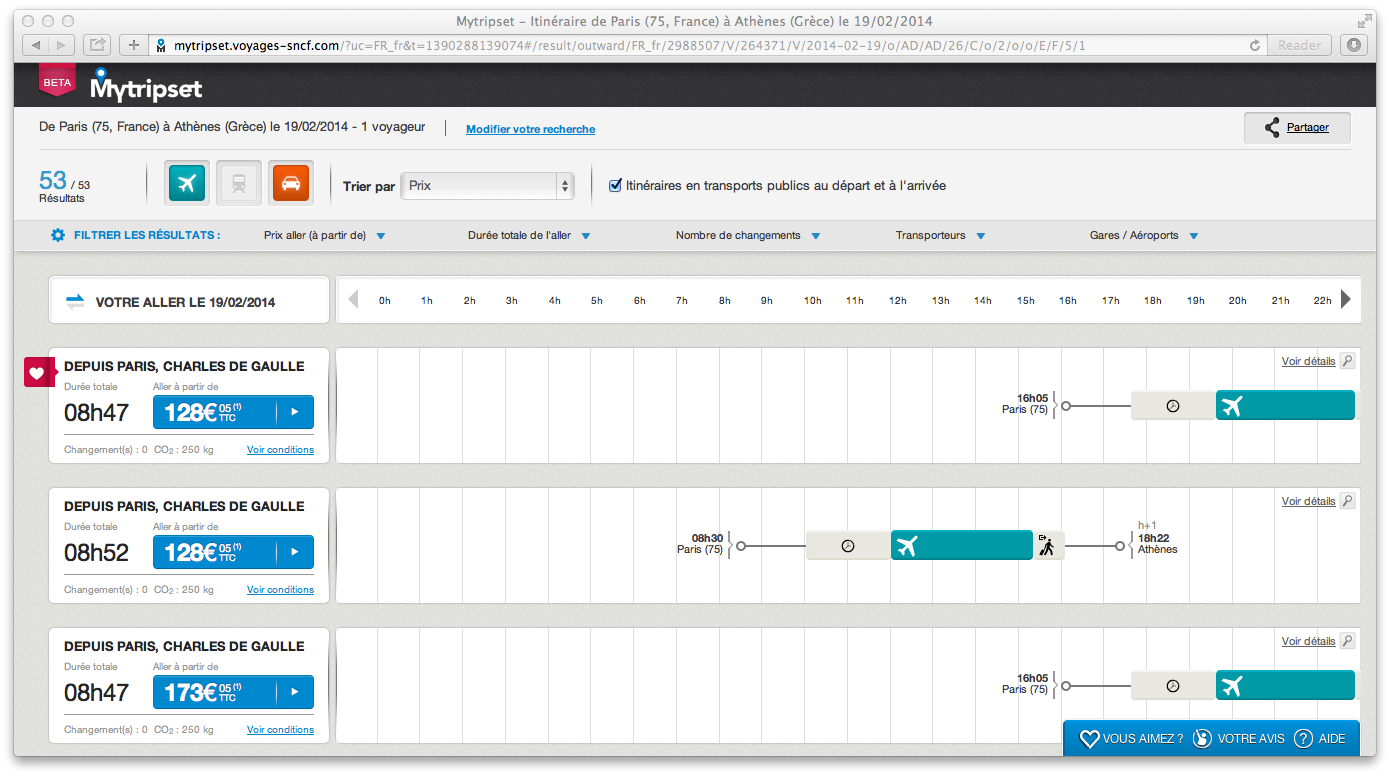

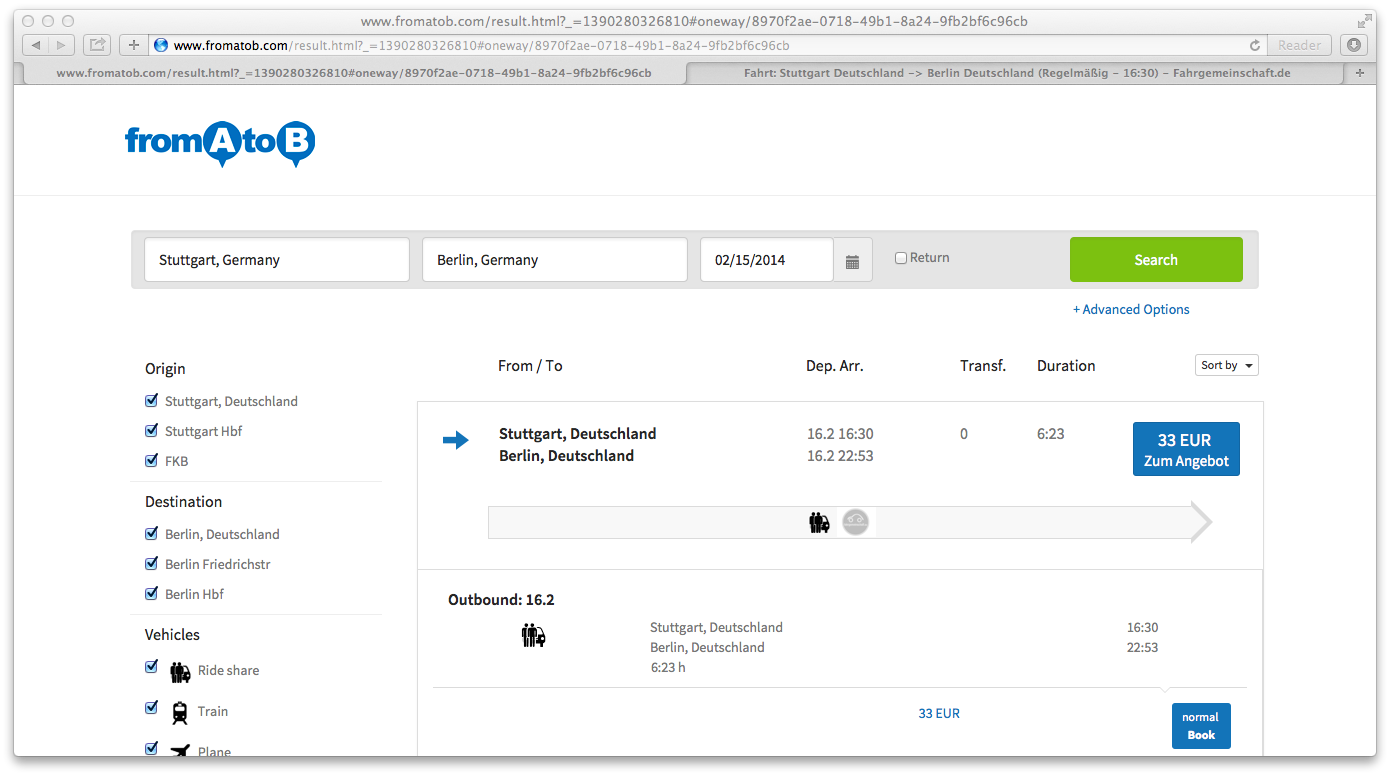
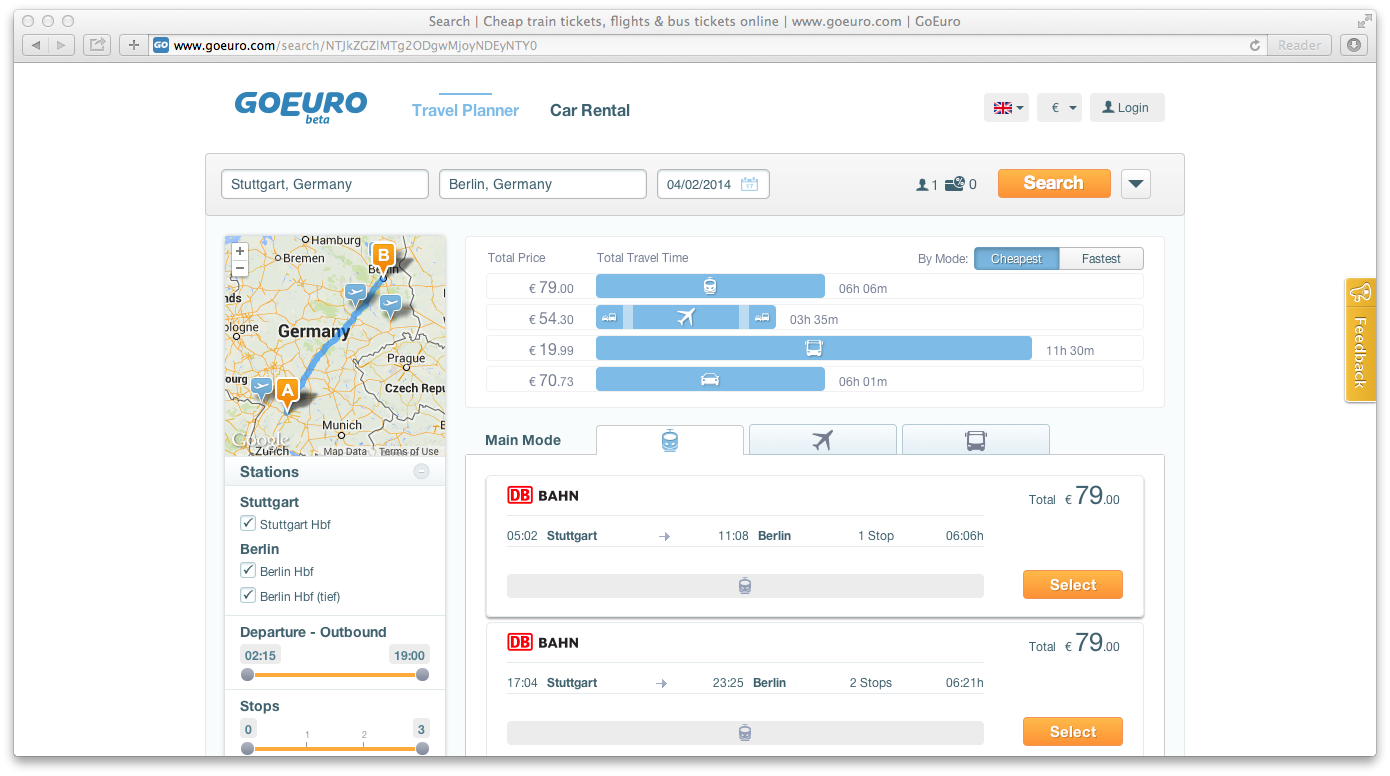
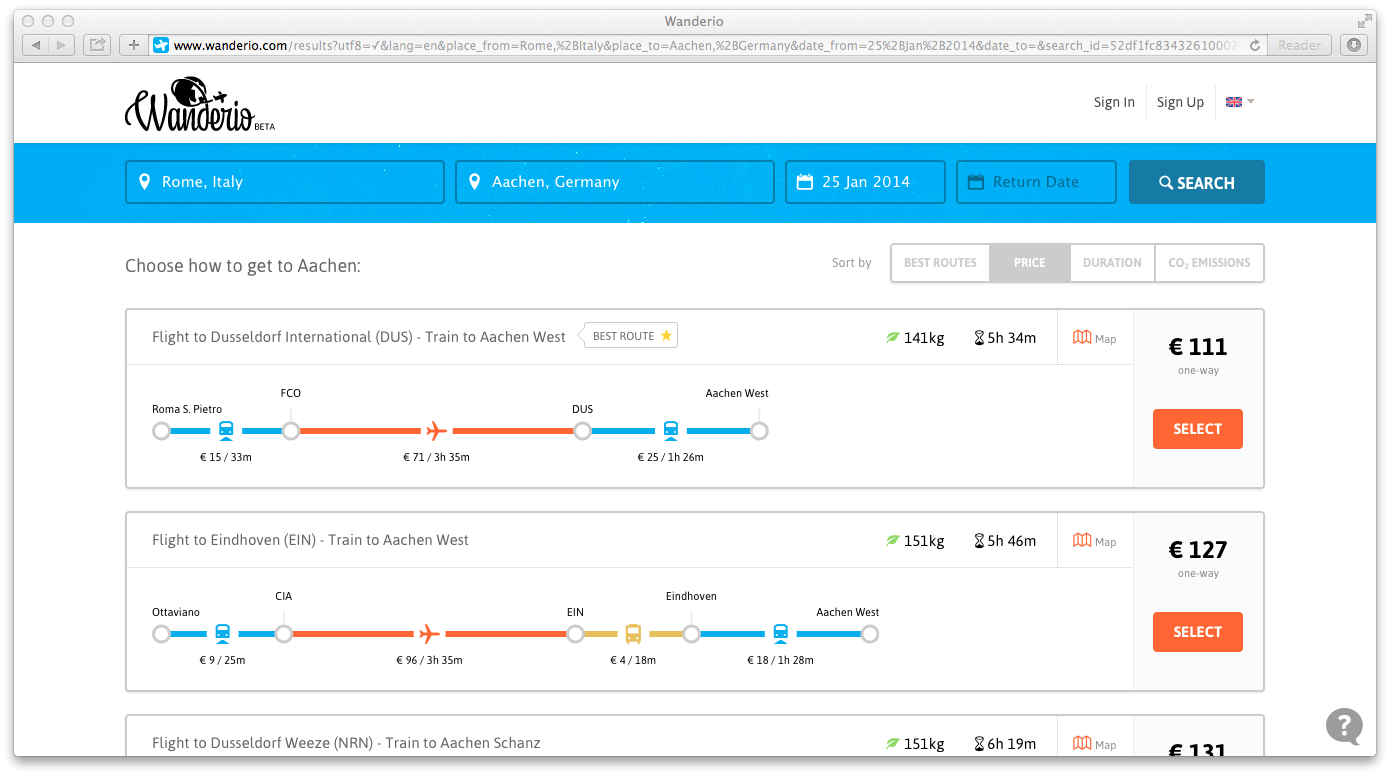

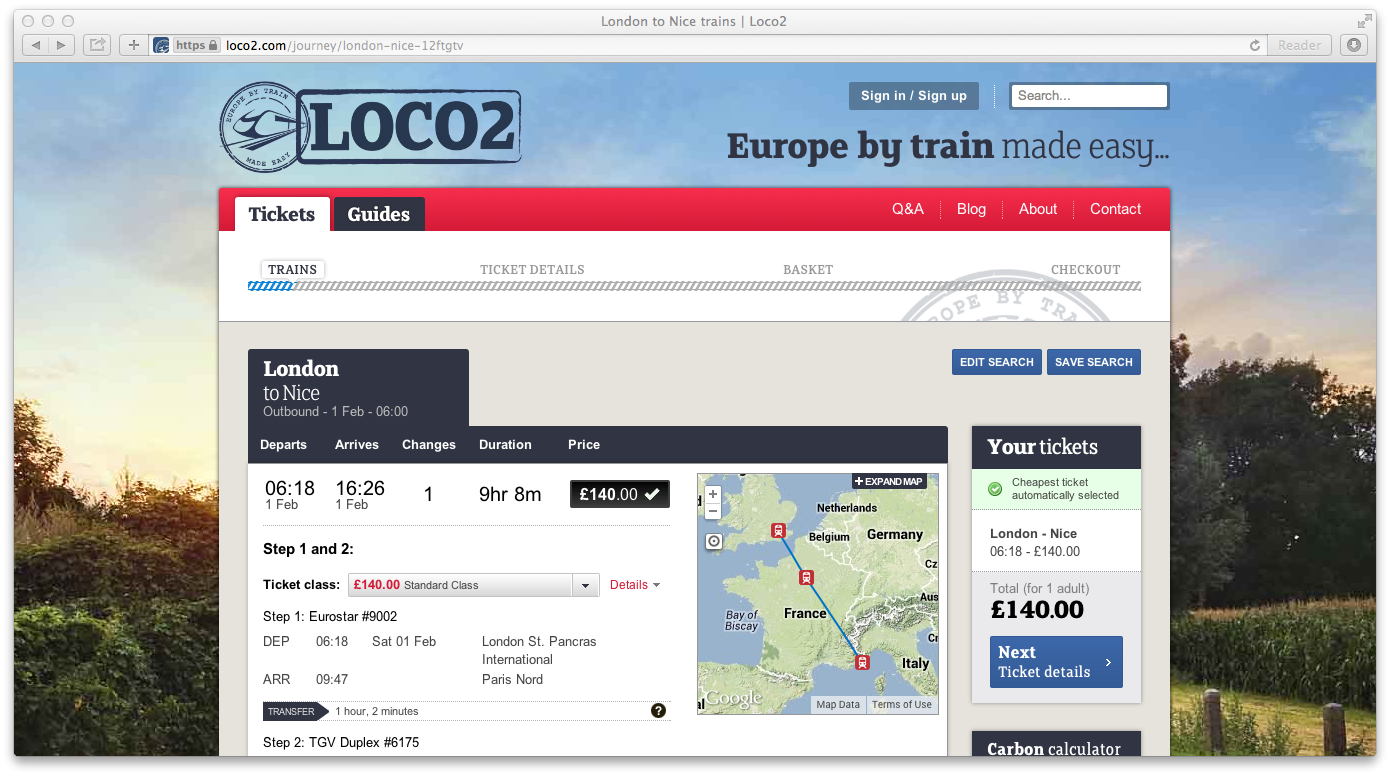
We are not so far away … Check my vision of the market here in : Digilution of travel – multimodal door-to-door search – v3 (http://fr.slideshare.net/welkaim/digilution-multimodal-doortodoor-search-v3)
Very nice article and great overview about the modal search market. You may add Moovel to your list of modal search engines (https://www.moovel.com/) and also http://www.carpooling.com when you talk about European ridesharing…
Hi Rod, great article, thanks for sharing all your thoughts 🙂 also the speed tips article was great! its the first travel blog where travel is just a tiny part of the content 🙂 love your blog & your project rome2rio, congrats!